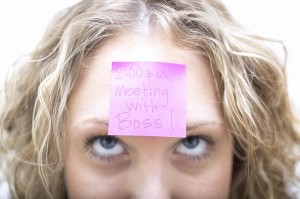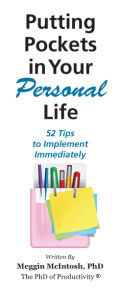Productive Appointments by Meggin McIntosh, PhD
 One of the best aspects of appointments is that we can prepare for them. This set of Top Ten Productivity Tips gives you ideas so that you can (and I hope, will) do the preparation work ahead of time that will allow your appointments to be effective, efficient, and productive for you and those with whom you are meeting.
One of the best aspects of appointments is that we can prepare for them. This set of Top Ten Productivity Tips gives you ideas so that you can (and I hope, will) do the preparation work ahead of time that will allow your appointments to be effective, efficient, and productive for you and those with whom you are meeting.
- Call and/or email prior to all appointments to confirm. It takes only a couple of minutes and may save you a couple of hours or more if the other person had forgotten or needs to reschedule. You’ll never regret confirming and may frequently regret it when you don’t invest a few minutes (and minor effort) to confirm.
- Arrive and/or be ready on time for your appointment (and this means planning to arrive early if you are traveling to an appointment). Consult the ‘pockets’ series that I have available if you need reminders and suggestions for putting ‘pockets’ in your life, such as allowing more time to travel than you think you’ll need.
- Expect that you will have to wait, so have something to work on or to read instead of sitting and twiddling your thumbs or leafing through old magazines or meaningless brochures. One of the great reasons to always have your planner with you is because it provides you with a vehicle to be productive during wait-time.
- Determine your questions, issues, or goals for the appointment. Write them down. Have your list handy to use during your appointment. Encourage others with whom you’re meeting to come prepared with questions or goals that they have for your appointment. It helps everyone. I used to request that my advisees come to our appointments with their questions in writing. They left with what they needed in terms of information and I was left with a feeling that I had been of assistance.
- Find out how much time the other person has. If this hasn’t been established ahead of time, find out right at the beginning of the appointment. Just a simple question like, “How much time do you have today?” will work. Don’t make this harder than it needs to be.
- Determine how much time you have. Make that clear to the other person, too. If it hasn’t been established prior to your appointment, provide it as you’re getting started. Everyone is served when the parameters are delineated.
- Agree on an agenda ahead of time (or at the beginning of the appointment). People think of agendas for meetings, but an appointment with even one other person is also a meeting. Have an agenda. Simple is fine.
- Meet where there are no (or limited) distractions (e.g., phone, email, drop-ins). If you are constantly distracted, one or both of you will be frustrated and you will be far less productive than you could have been.
- Set up the environment for productivity (close door, ask that phones be turned off). Make it clear that you have turned off your cell phone for your appointment – either with the hope that your companion will, too – or as a way of indicating that you’d like him/her to silence the phone, as well.
- Have the tools you need to be productive (your planner, some place to take notes, a timer so you don’t have to keep checking your watch). Get set up so you’re ready. You don’t want to be borrowing a pencil part way through your appointment. Arriving without the necessary tools makes it look as if you didn’t have any expectations for the appointment.
Consider making these practices part of your personal and professional culture. Bring them up at a future staff meeting for discussion and buy-in.
And if you liked these tips, feel free to check out Putting Pockets in Your Personal Life: 52 Tips to Implement Immediately. If you know you are operating without any “pockets,” and you realize that you have lost sight of the difference between calm and crazed, then this booklet will help you regain that realization and subsequently DO something about it.
Inside, you’ll find practical ideas to implement, letting you actually choose to put in pockets in your personal life (i.e., some protected space, both the physical and metaphorical). With these 52 tips in-hand, and you’ll be well on your way to greater peace of mind and productivity.






